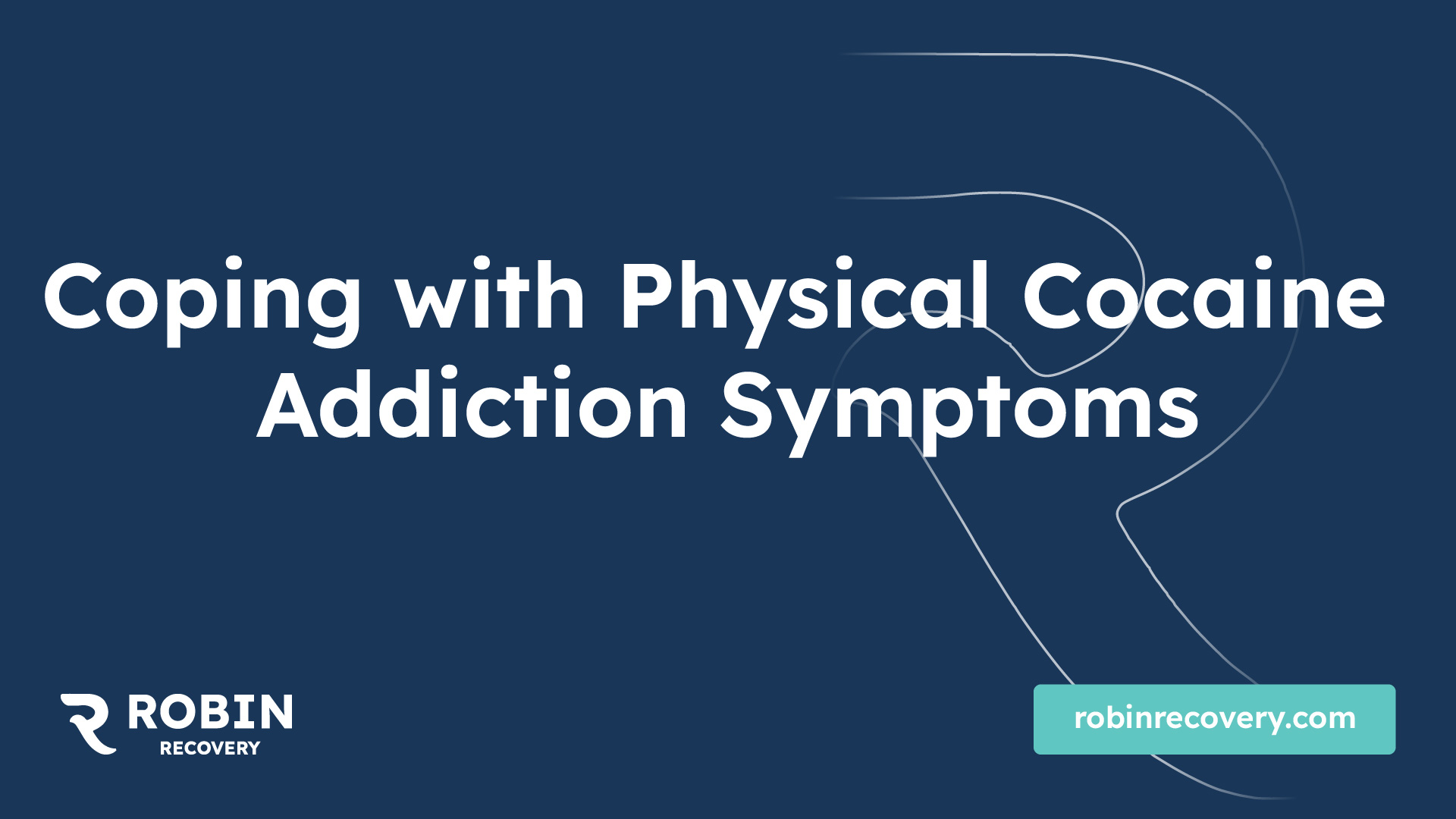Coping with Physical Cocaine Addiction Symptoms

Understanding Cocaine Addiction
Prevalence of Cocaine Use
Cocaine addiction is a significant public health issue in the United States. Statistics indicate that slightly less than 15% of the American population over the age of 12 has experimented with cocaine at least once. Remarkably, approximately 75% of these individuals develop a dependency on the substance [1].
Recent data reveal that around 4.8 million Americans over the age of 12 use cocaine each year, with about 500,000 individuals struggling with an addiction to the drug. Furthermore, approximately 14% of adults report having tried cocaine at some point, while one in every 40 adults claims to have used cocaine within the past year. The highest usage rates are among young men aged 18 to 25, with 8% admitting to using cocaine in the past 12 months.
StatisticPercentage/CountAmericans who have tried cocaine14%Annual cocaine usersApproximately 4.8 millionAddiction prevalenceAbout 500,000 adultsUsers aged 18-258% in the past year

Hazardous Effects of Cocaine
Cocaine is one of the most hazardous illicit drugs. It can cause significant physical and psychological harm. Contrary to popular belief, cocaine is highly addictive and not a harmless substance. Approximately 30 to 40 million Americans have experimented with cocaine, with 5 to 6 million being compulsive users [4].
Short-term effects of cocaine usage include:
These short-term effects can lead to severe outcomes such as paranoia, panic attacks, and hallucinations. After the stimulating effects subside, users often experience intense fatigue, depression, and agitation.
Long-term use poses serious health risks, including:
Persistent cocaine use without intervention can lead to permanent health issues [5]. It is crucial for individuals encountering signs of addiction to seek support, as recognizing and understanding these effects can significantly impact the journey toward recovery. For more information on recognizing addiction, visit our article on signs of drug use in men.
Short-Term Effects of Cocaine
Cocaine use can lead to distinct short-term effects that impact both physical and psychological well-being. Recognizing these symptoms is vital for understanding the immediate consequences of this powerful stimulant.
Physical Symptoms
The physiological responses to cocaine are rapid and can be severe. Common physical symptoms include:
Physical SymptomsDescriptionIncreased heart rateHeart rate can significantly elevate.Elevated blood pressureUsers may experience dangerously high blood pressure.Rising body temperatureBody temperature can spike rapidly.Dilated pupilsPupil dilation is a hallmark sign.Decreased appetiteUsers often report reduced hunger.Increased energyUsers may feel an adrenaline rush.InsomniaCocaine can lead to sleeping difficulties.Heightened alertnessIncreases sensitivity to stimuli.
These physical symptoms allow cocaine users to feel a sense of euphoria and heightened energy. However, these effects can lead to dangerous outcomes, including panic attacks and hallucinations. Upon the drug's effects subsiding, users frequently face intense fatigue, depression, and agitation.
Psychological Impact
The psychological effects of cocaine are equally significant. Users experience:
Psychological EffectsDescriptionEuphoriaIntense feelings of happiness and exhilaration.Increased mental alertnessSharp focus and reduced perception of fatigue.Anxiety and paranoiaHeightened anxiety and feelings of suspicion.HallucinationsUsers may see or hear things that are not present.AgitationIncreased irritability or restlessness.Mood swingsQuick changes in emotional states.
Cocaine increases dopamine levels in the brain, leading to feelings of pleasure. However, the alteration of the brain's reward system fosters tolerance and dependence with repeated use. Users may also encounter short-term mental health challenges such as panic attacks, tremors, and muscle spasms [7]. Recognizing these symptoms is critical for understanding the scope of cocaine's impact on both mental and physical health.
Long-Term Effects of Cocaine
Long-term use of cocaine can lead to significant health complications and persistent consequences. Understanding these effects is vital for those looking to address addiction and its symptoms.
Chronic Health Risks
Cocaine addiction poses severe health risks that can escalate over time. The physical health complications associated with long-term cocaine use may include:
Health RiskDescriptionHeart ProblemsCocaine abuse significantly increases the risk of heart attacks, which account for 25% of deaths among individuals aged 18-45 who abuse cocaine or crack cocaine [8].Lung DamageMethods such as smoking cocaine can lead to respiratory issues and lung damage.Neurological ComplicationsCocaine can cause seizures and increase the likelihood of strokes, both of which have long-term effects on neurological health.Gastrointestinal IssuesProlonged use can result in conditions like ischemic colitis, which causes inflammation and injury to the large intestine, leading to severe digestive issues [8].HeadachesChronic use can result in persistent headaches.
Cocaine’s impact on physical health can be life-threatening, making it crucial to seek help and break the cycle of addiction.
Permanent Consequences
The long-lasting effects of cocaine can lead to permanent consequences that affect an individual’s quality of life. Some of these effects include:
Permanent ConsequenceDescriptionHeart DamageContinued cocaine use can result in irreversible heart damage, increasing the risk of heart disease and failure.Neurological DamageRepeated exposure can lead to lasting neurological impairments, including attention deficits and cognitive decline.Respiratory IssuesFor those who smoke cocaine, chronic lung conditions may develop, significantly affecting breathing.Gastrointestinal DamageDamage from ischemic colitis can lead to long-term digestive complications, potentially resulting in severe health emergencies [8].Dental ProblemsUsers may suffer from gum irritation, ulcers, and other dental issues due to the methods of cocaine intake [7].
Awareness of these risks can aid in recognizing the urgency of addressing addiction. A comprehensive approach to treatment can lead to a healthier recovery and potentially mitigate some of these lasting effects.
Treatment for Cocaine Addiction
Therapeutic Approaches
Treating cocaine addiction involves a range of therapeutic approaches designed to help individuals recognize triggers, develop healthier coping mechanisms, and rebuild their lives. Several types of therapy are commonly utilized in cocaine addiction treatment:
For more detailed insights into therapeutic techniques, individuals may find our articles on anger is a d word and the acronym halt beneficial.
Medication and Craving Management
While there are currently no FDA-approved medications specifically for cocaine addiction, several options can help manage cravings and withdrawal symptoms. Medications can assist in reducing the intensity of psychological stress experienced during withdrawal, which is particularly important as cocaine withdrawal does not typically result in physical symptoms, but may cause significant emotional distress [9].
Here are some potential medications used in managing cocaine addiction:
MedicationPurposeDisulfiramUsed for a range of addictions, this medication may help reduce cravings by creating negative reactions if cocaine is used.ModafinilA wakefulness-promoting agent that can help alleviate some withdrawal symptoms and cravings.TopiramateOften used for epilepsy and migraine prevention, it may assist in reducing cocaine use and improving mood in some patients.
Effective outcomes are often achieved by combining pharmacotherapy with behavioral therapies. Individuals looking for alternative approaches to alleviate addiction symptoms can explore related topics such as drug use in the workplace or signs of drug use in men.
As individuals progress through treatment, the integration of therapeutic and medication strategies helps address not only the addiction but also its psychological underpinnings. This multifaceted approach aims to support individuals on their journey to recovery, equipping them with the tools necessary to manage cravings and lead fulfilling lives free from cocaine dependency. For those seeking a broader understanding, further information on the dangers of binge drug use may provide additional context.
Causes of Cocaine Addiction
Cocaine addiction can stem from a complex interplay of genetic and environmental factors. Understanding these causes provides insight into why some individuals may develop a dependency on this powerful stimulant.
Genetic Factors
Genetic predisposition plays a significant role in an individual's likelihood of developing a cocaine addiction. Certain genetic traits may make some people more susceptible to addiction. This can include variations in genes that affect the brain's response to dopamine, the chemical associated with pleasure and reward. Individuals with a family history of substance abuse are at a higher risk of experiencing similar issues, including physical cocaine addiction symptoms.
Withdrawal from cocaine can also have genetic components. Individuals who abruptly stop using cocaine often face various withdrawal symptoms, such as depression, anxiety, fatigue, increased appetite, vivid and unpleasant dreams, and slowed activity. These symptoms typically resolve within one to two weeks after discontinuing the substance.
Environmental Influences
Environmental factors significantly impact the development of cocaine addiction. Repeated use of cocaine can lead to permanent alterations in the brain's chemical makeup, resulting in long-term challenges for the individual. Key environmental influences include:
Environmental FactorDescriptionFamily EnvironmentExposure to substance abuse or neglect can increase the risk of addiction.Peer PressureFriends or social circles that normalize drug use can lead to experimentation and subsequent addiction.Socioeconomic StatusLimited economic opportunities may result in heightened stress and increased likelihood of seeking drugs as a coping mechanism.
Cocaine use often leads to risky behaviors, further complicating health outcomes. The risk of contracting HIV or hepatitis C is notably increased due to impaired judgment. Research shows that cocaine use can accelerate the progression of HIV and negatively affect immune function, amplifying the damage caused to the brain and nervous system [7].
Understanding both genetic factors and environmental influences helps identify at-risk individuals and paves the way for effective prevention and treatment strategies. For additional insights into coping with addiction, consider exploring resources related to anger management and the acronym HALT.
Withdrawal and Recovery
Coping with symptoms during withdrawal from cocaine is an important aspect of recovery. Understanding the physical cocaine addiction symptoms one might experience will help individuals prepare for the challenges ahead.
Symptoms of Withdrawal
Withdrawal from cocaine can result in various psychological symptoms as the body adjusts to the absence of the drug. Individuals dependent on cocaine may encounter these symptoms when they stop using the drug abruptly. Key withdrawal symptoms can include:
SymptomDescriptionIrritabilityIncreased feelings of frustration or anger.FatigueExtreme tiredness and lack of energy.Increased appetiteA marked increase in hunger or cravings.Sleep disturbancesDifficulties in falling or staying asleep.Vivid and unpleasant dreamsDisturbing dreams that are often distressing.DysphoriaA sense of unease or dissatisfaction.Slowed activityReduced energy and slower movements.
These symptoms typically arise after prolonged cocaine use and can resolve within one to two weeks after cessation. Although cocaine withdrawal does not produce physical symptoms in the same way that some other substances might, the psychological stress can be intense, often making it difficult for individuals to remain abstinent.
Long-Term Recovery Strategies
Maintaining sobriety after overcoming withdrawal symptoms is crucial for long-term recovery. The following strategies can support individuals in their journey back to a healthier life:
Implementing these long-term recovery strategies can make a significant difference. Individuals on the path to recovery are encouraged to seek help and utilize available resources to aid in their journey towards comprehensive physical and mental health recovery. For more information on addiction and coping strategies, individuals can check out anger is a d word and other related articles.
References
[2]:
[3]:
[4]:
[5]:
[6]:
[7]:
[8]:
[9]:
